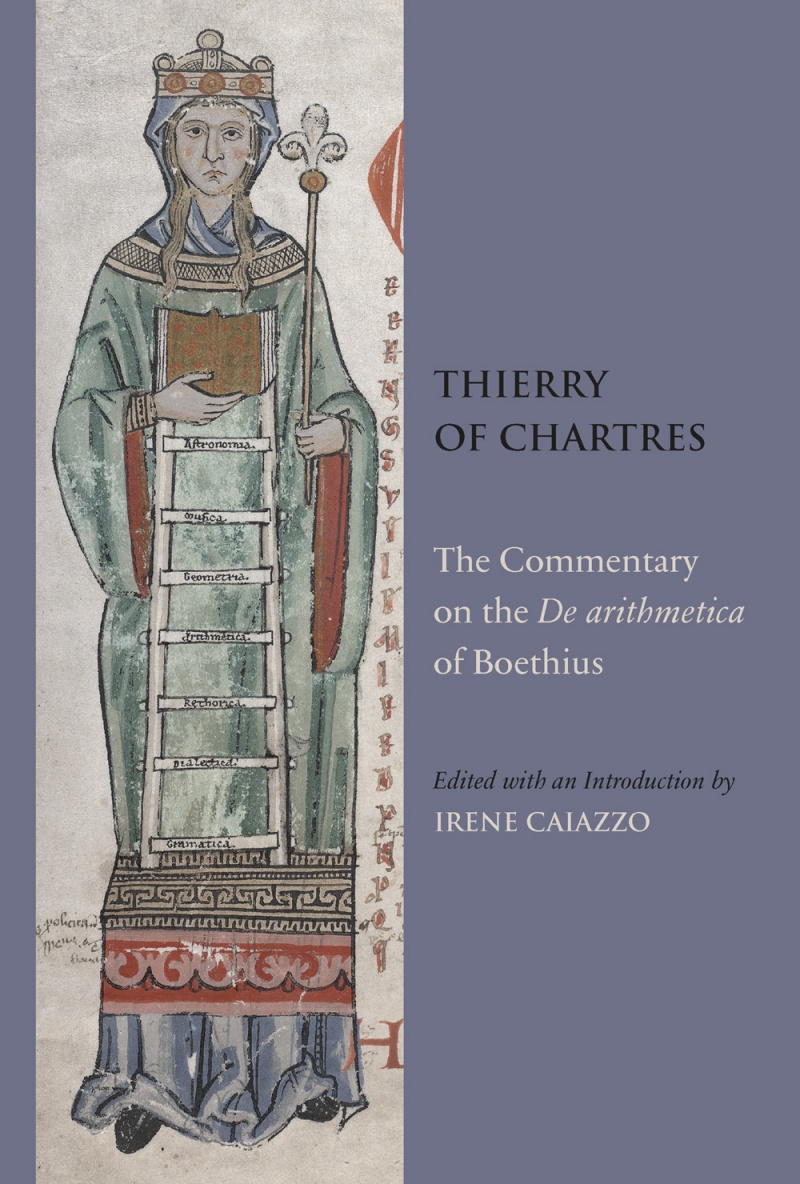
Thierry of Chartres: The Commentary on the De arithmetica of Boethius
Studies and Texts 191. 2015. xii, 262 pp. ISBN 978-0-88844-191-1 • Cloth • $95
Arithmetic was one of the seven liberal arts taught in the French schools just before the middle of the twelfth century, and Boethius’s De arithmetica was the principal textbook for this art. This volume provides an edition of a commentary on the De arithmetica; the accompanying introduction identifies the author of the commentary as Thierry of Chartres, and provides a careful consideration of how the commentary reflects his philosophy.
Unlike the commentaries on Plato's Timaeus and on Boethius's Consolatio philosophiae, medieval exegesis of Boethius's De arithmetica has seldom been subjected to comprehensive and systematic enquiry. Inhabiting the shifting boundary between philosophy and history of science, the De arithmetica itself has been neglected by most medievalists. Yet, from the Carolingian renaissance onward, when the scholarly curriculum came to be based on the seven liberal arts, Boethius's work soon became a canonical text for the study of arithmetic. Indeed, the growing interest in it during the twelfth century is attested by the large number of surviving commentaries in manuscript.
The commentary on the De arithmetica preserved in Stuttgart, Württembergische Landesbibliothek, Cod. math. 4° 33 and edited here for the first time can be securely attributed to Thierry of Chartres. It belongs to a phase when the Chartrian master's interests were mainly directed toward the liberal arts. We can also discern in Thierry's commentary on the De arithmetica themes and problems developed in his Tractatus de sex dierum operibus and more elaborately in his commentaries on Boethius's Opuscula sacra. Indeed, the discovery of this commentary on the De arithmetica might legitimately be said to clarify not only the more intractable passages in the theological writings but also to illuminate Thierry's philosophical project as a whole. At the heart of that vision is a developing trend in twelfth-century philosophy that places number and proportion at the heart of the physical cosmos. In this profoundly 'mathematical Platonism,' all things are based on number and follow the rule of number; or, to quote Thierry himself, “creatio numerorum, rerum est creatio.”
Author
A specialist in the history of medieval philosophy as well as the history of science, Irene Caiazzo received her doctorate in 1999 and her Habilitation in 2012 from the Ecole pratique des Hautes Etudes, Paris. She is currently directeur de recherche at the Centre national de la recherche scientifique. The author of Lectures médiévales de Macrobe: Les “Glosae Colonienses super Macrobium” (2002), she is also co-editor (with Barbara Obrist) of Guillaume de Conches: Philosophie et Science au XIIe siècle (2011) and (with Pasquale Arfé and Antonella Sannino) of Adorare caelestia, gubernare terrena (2011), a collection of papers in honour of Paolo Lucentini. Her essays on twelfth-century thought, informed equally by philological learning and philosophical sensitivity, cover a wide range of themes (such as the anima mundi, the four elements, prime matter, harmony, and Nature) as well as texts and traditions (from readings of Plato's Timaeus to the medical School of Salerno and the influence of Aristotle's natural philosophy in the West).
Contents
Preface • ix
Abbreviations • xi
Introduction • 3
Thierry of Chartres and the School of Chartres • 3
Commentary and Commentator • 22
Thought, Language, Philosophy • 34
Traditions of Commentary on the De arithmetica • 70
Some Concluding Reflections • 80
The Present Work: From Manuscript to Edition • 81
TEODORICUS CARNOTENSIS: Commentum super Arithmeticam Boethii • 91
Appendix: A Handlist of Medieval Commentaries on Boethius's De arithmetica • 209
Bibliography • 211
Indexes • 237
Endorsements
“Irene Caiazzo is to be congratulated for discovering this commentary on Boethius's Arithmetic which fills in a missing dimension of the speculative thought of the School of Chartres. Thierry of Chartres's famous claim to prove Christian theology through arguments from mathematics can now be complemented by his own interpretation of Boethius's fundamental text on the first mathematical art. We now have a much fuller understanding of how mathematics, cosmology and theology supported each other in the teachings of Thierry's school.”
CHARLES BURNETT
Warburg Institute“The importance of mathematics for Thierry of Chartres's theological, specifically Trinitarian, reflections on Boethius's Opuscula sacra has engaged generations of scholars. Irene Caiazzo's discovery of Thierry's commentary on Boethius's De institutione arithmetica, edited for the first time in this volume, finally allows scholars to study the formation and development of crucial elements in Thierry's mathematical theology through his detailed and bold explication of Boethius's arithmetical handbook. Accompanied by an introductory study that forcefully argues for Thierry's authorship of the anonymously transmitted commentary by measuring it against the shifting but coherent doctrinal positions staked out in Thierry's theological commentaries, Caiazzo's meticulous edition will substantially reshape and refine our understanding of the Breton master, extolled by John of Salisbury as the artium studiosissimus investigator and acclaimed by Hermann of Carinthia as the soul of Plato reincarnate.”
ANDREW HICKS
Cornell University“My first contact with the Pontifical Institute of Mediaeval Studies was through Nikolaus Häring’s studies of Thierry of Chartres. I am happy, after many decades during which I had the privilege of teaching and working at the Institute, to welcome this first edition of a commentary on the De arithmetica of Boethius, which Irene Caiazzo attributes persuasively to the Chartrian Master. The Latin text is preceded by a wide-ranging introduction to Thierry’s philosophical project and its historical context. The volume is bound to reshape our views of twelfth-century thought and spur us to rethink the significance it gave to the study of the seven liberal arts, particularly mathematics.”
EDOUARD JEAUNEAU
Pontifical Institute of Mediaeval Studies
Ordering
Detailed information about ordering, including sales territories and methods of payment, is available on our ordering page. PIMS books are also available on Amazon.ca (for Canadian customers) and Amazon.com (for customers in the U.S.).


